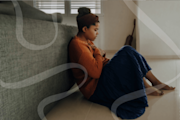During most of my childhood, my mind jumped from one anxiety and anxious thought to the next.
Sometimes I was anxious about little things, like clean underwear.
Growing up with divorced parents, my little sister and I went back and forth between our parents’ homes almost every other night. My dad didn't keep any clothes for us, so we had to pack everything for the next day.
Sometimes I was anxious about little things, like clean underwear.
As my little sister and I would wait at the curb for my dad to pick us up, I’d check my bag and tug through clothes to locate my clean underwear. More than once I’d forgotten to pack them. And I was frequently anxious about it.
After checking through my bag for the underwear, I’d look up and see my little sister on the curb, twirling in circles. "You're too close to the street!" I’d snapped at her, my breath stuck between my ribs.
“What if a car rolled past and hit her?” I thought.
I learned I have general anxiety disorder (GAD).
Other times, my anxiety and worry was so enormous—the drought in California or a war overseas—that I'd cry myself to sleep.
It wasn’t until my twenties that a therapist gave me a diagnosis for what my father had always referred to as my “being-an-overly-sensitive-child.”
I learned I have general anxiety disorder (GAD).
Every woman interviewed for this story says the COVID-19 pandemic made them realize how much their anxiety was affecting their lives.
"On its own, anxiety is a normal human emotion," says dual board-certified neurologist and psychiatrist, Dr. Julia Samton, M.D., who specializes in treating anxiety.
"As humans we're going to experience some anxiety,” explains Dr. Samton, the cofounder of The Midtown Practice in New York City.
"It's important for a clinician to figure out if this anxiety reaches a clinical level," she says. "In other words, if it's interfering with your life, that's when we move to treatment."

Anxiety and the global pandemic
According to Dr. Samton, the COVID-19 pandemic has been a traumatic time for all of us.
“From a clinician's perspective, it was the first time that we all experienced trauma with our clients," she explains.
I hit a breaking point with my mental health.
Success Coach Julie Lowe, the mom of two boys in Lexington, Kentucky, had been running a successful consulting company for nine years when the pandemic hit.
"I hit a breaking point with my mental health," Lowe says.
As the founder of Socially Aligned, she says that she was trying to work full-time from home while homeschooling her kids when "everything kind of hit,” including not being able to sleep.
“During the pandemic, it all kind of fell into place for me,” says Liz Prato, a licensed massage therapist in Portland, Oregon, and author of Kids in America: A Gen X Reckoning.
When her mind was racing and sometimes Prato felt as if she couldn’t breathe, she realized: “Oh, I’ve had anxiety my whole life."
The same is true for Sondra in Southern California (who prefers not to use her last name). "I didn't recognize my own anxiety until it started to affect my youngest son,” she says.
Oh, I’ve had anxiety my whole life.
“My son was 10 at the time when schools closed due to COVID restrictions," she explains. "He started experiencing anger issues and violent outbursts for the first time in his life and it made me realize that my stress and anxiety—even though I tried very hard to hide it from him—were affecting him."

Amanda Rawson Hill, a writer in California whose next novel,The Hope of Elephants, is due out in September, says her anxiety first showed up when she was in college. Though, at the time she didn’t realize what was going on.
"I would have panic attacks in the testing center during a test,” she says. “But I didn't realize that's what they were and that they were related to anxiety."
During the COVID-19 pandemic, Amanda's mom and sister kept asking her to get some support.
Amanda finally took an online quiz about anxiety, saw a psychologist, received an anxiety diagnosis, and was prescribed the antidepressant Lexapro.
“I started feeling a difference in about a week or two,” she says.
Every woman interviewed for this story says the COVID-19 pandemic made them realize how much their anxiety was affecting every part of their lives.
Name your anxiety to tame it
Sometimes, putting a name to anxiety is enough to help understand it.
In my own life, I thought my coping strategies—going to yoga or therapy or seeing girlfriends—would keep me grounded.
But during the pandemic, as a journalist and the mother of two daughters, I became overwhelmed with handling homeschooling, working, and maintaining my marriage.
I was up for hours, worrying about COVID or the climate crisis.
I also come from a family of addicts, so I was hesitant about taking medication for my anxiety. I tried to stay connected online and continued to see my therapist in teletherapy video sessions twice a month, but some nights the anxiety consumed me.
I was up for hours, worrying about COVID or the climate crisis. Sometimes at the same time.
And as I tried to manage my anxiety with the coping strategies I was taught, my mental health struggles seeped out to my children and my partner.
The insomnia and sleep deprivation wore on me.

Alas, I finally faced my hesitation about medication and made a call to my doctor.
Seven months ago, I started taking Lexapro, and the changes are evident.
I'm sleeping again. I'm more focused. I'm letting go of the anxious thoughts that used to paralyze me.
"There's definitely a difference for me between being on the meds and not," says Amanda, explaining that she started taking Lexapro during the pandemic but switched to Zoloft when she found out that she was pregnant.
I'm letting go of the anxious thoughts that used to paralyze me.
"I've been able to function again," she says.
A year into the pandemic, Liz in Portland found support in a book by Courtenay Hameister called Okay Fine Whatever: The Year I Went from Being Afraid of Everything to Only Being Afraid of Most Things.
"I picked up the book because I was so on edge—so close to losing it—from both the devastating Portland-area wildfires and the pandemic," Liz says.
According to Liz, reading Hameister’s book and the descriptions of her own dread helped Liz to connect many dots in her own life. Notably, she took note of the fact that her father and brother had both suffered from serious mental illness.
Classes for her career as a licensed massage therapist also helped Liz understand how stress affects our nervous systems.
SSRI and SNRI antidepressant medications for anxiety
"I had taken antidepressants at various times in my life, after some trauma,” explains Sondra. “And my PTSD came rearing its ugly head once COVID hit."
In the summer of 2021, Sondra found a new therapist online, who prescribed the anti-anxiety medicine Inderal, as well as the antidepressant Zoloft.
It took about two weeks for Sondra to feel better.
"The adjustment period for this was difficult," Sondra says. "My husband took our youngest out of town, so I spent the entire week adjusting to the medicine which I nearly quit after the third day due to the major side effects."
It took about two weeks for Sondra to feel better.
"I wasn't able to work or do much this entire week," she says. "But once I started week two of daily meds, I felt like a whole new person and had only wished I had started taking them earlier."
Dr. Samton says the most common medications prescribed for anxiety generally fall into the category of SSRIs or SNRIs.
SSRIs:
Prozac (fluoxetine)
Zoloft (sertraline)
Celexa (Citalopram)
Lexapro (Escitalopram)
Paxil (Paroxetine)
Viibryd (Vilazodone)
Fluvoxamine (Luvox)
Trintellix (Vortioxetine)
SNRIs:
Effexor XR (venlafaxine)
Pristiq (Desvenlafaxine)
Cymbalta (Duloxetine)
The difference between SSRIs and SNRIs is that SSRIs impact the levels of neurotransmitters called serotonin, whereas SNRIs impact the levels of both serotonin and norepinephrine.
Both can help with anxiety, however SNRIs can sometimes help when people have tried SSRIs and not gotten relief.

Anxiety treatments and coping strategies
"Therapy and medication have definitely been a life-saver for me," explains Sondra. She says hiking a few days a week has also helped to relieve her anxiety.
She also quit drinking.
Sondra tells us she’s been sober since Thanksgiving 2020.
"I couldn't be happier,” she says. “I think I was hiding my anxiety and depression all these years by self-medicating."
Today, Liz in Portland says that she regularly gets messages, takes baths, and plays the ukulele.
According to Liz, the TV show Ted Lasso taught her the helpful technique of Controlled breathing.
"I also don’t watch TV shows or read books that can plunge me into anxiety and despair," she says.
According to Liz, one particular TV show taught her the helpful technique of Controlled breathing.
"The most important skill I’ve learned is to pay attention to the early signs of anxiety in my body and, believe it or not, I learned about breathing techniques from Ted Lasso!" she explains. "Controlled breathing has had a really profound effect on being able to re-route my nervous system."
Julie in Kentucky says that part of taking care of herself is influenced by her new career as a life and success coach who specializes in teaching nervous system regulation, stress management, self-care practices, and subconscious reprogramming to high-achievers.
She created a system called "DESIGN" to manage anxiety, which she says, "really helped me to successfully come off the daily anxiety meds when I was ready.”
Daily Movement
EFT Tapping (especially helpful in the moment when feeling stressed or having a panic attack)
Sensing Meditation
Investigate Stressors (what's in my control and what's not? If it's in my control I can problem solve, if not, can I change my attitude about it?)
Get Connected (co-regulate with people that make you feel calm - whether that's a friend, coach or therapist and don't isolate yourself)
Nervous System Regulation (humming, rubbing, or clapping our body, tense, and release -- and of course good sleep habits and exercise)

According to the Anxiety and Depression Association of America (ADAA), an international nonprofit organization founded in 1979 and Dr. Samton, 18% of Americans are diagnosed with an anxiety disorder each year and only 37% are treated.
"I don't think people really understand the degree of impact that the COVID-19 pandemic has had on everyone," says Dr. Samton.
"It's been pretty destabilizing, and certainly has brought up a ton of anxiety, and there's a good reason for it," she says. "At the same time, seeking treatment can be very helpful."
Find out more about COVID trauma.
Do I have an anxiety disorder?
If you're concerned you might be dealing with anxiety, take our free 2-minute online anxiety assessment.
It was developed using the GAD-7, a widely used tool to screen for anxiety symptoms.
Keep in mind, the results from the screening should not be used as a replacement for professional help.
How do I find a therapist who specializes in anxiety?
The Monarch Directory by SimplePractice makes it easy to find a therapist who specializes in treating anxiety.
You can click on the drop down filters, choose anxiety, and enter your location.
Choose to book telehealth video sessions or in-person appointments, and even filter by availability and request a free 15-minute phone consultation directly online.
Remember, anxiety doesn’t have to control your life. Talking with a licensed mental health professional may help.
READ NEXT: Do I Have Anxiety—and What Exactly Is It?
Find a therapist who specializes in treating anxiety. Check out the Monarch Directory by SimplePractice to find licensed mental health therapists near you with availability and online booking.





